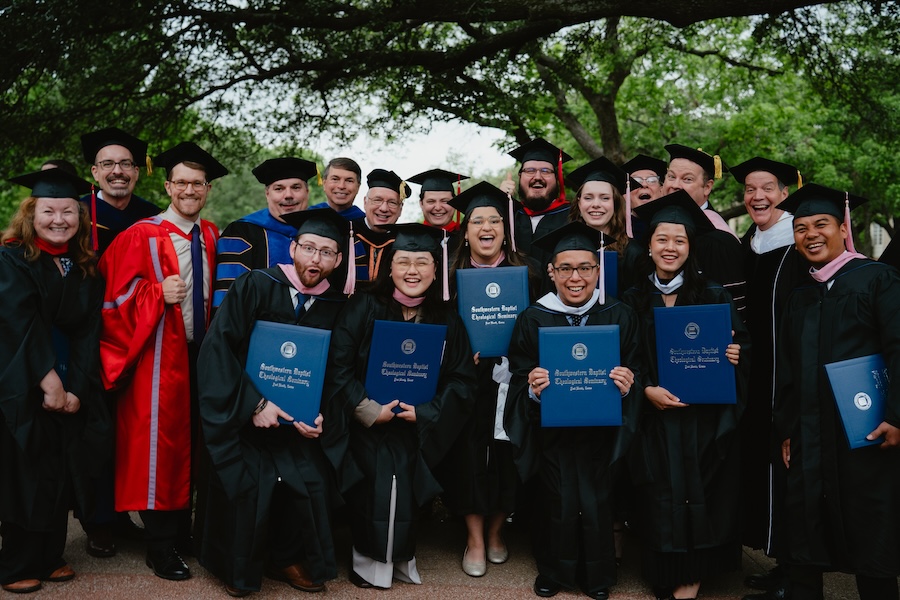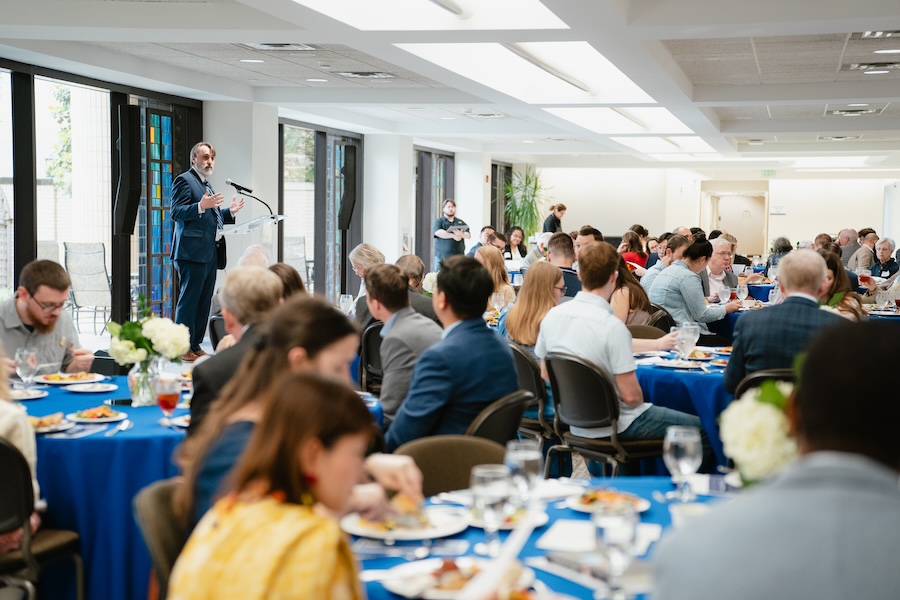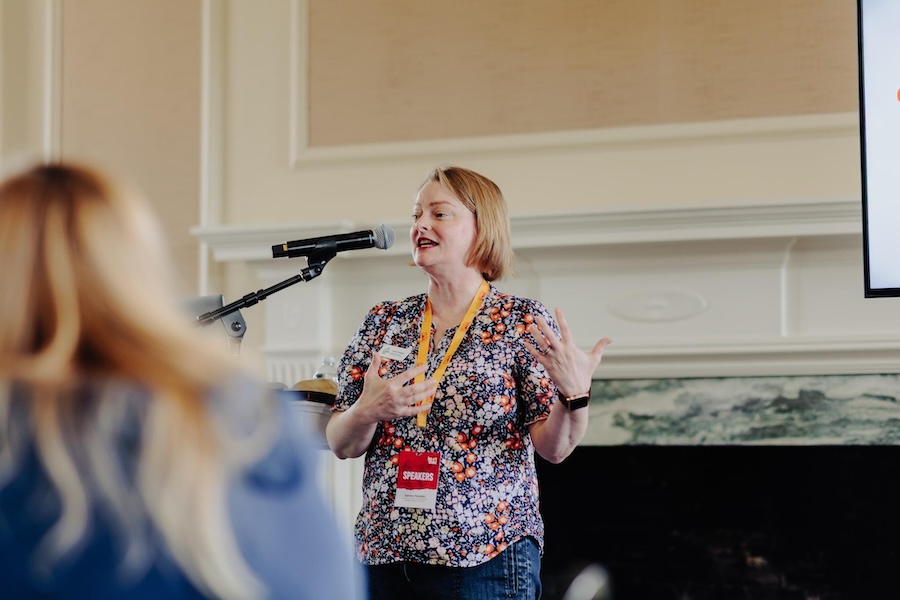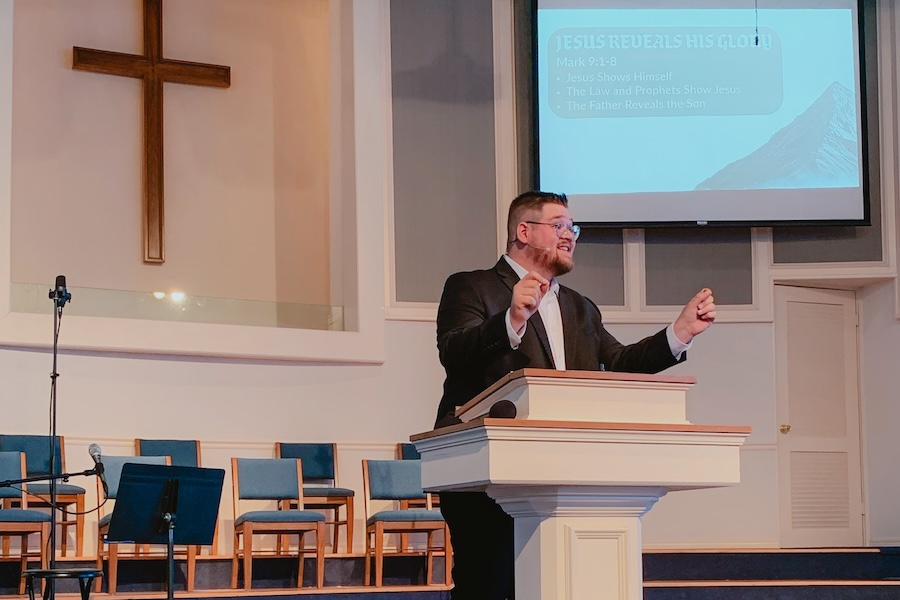Global Missions Week produces ‘extraordinary’ interest and response from Southwestern, TBC students

The World Missions Center (WMC) welcomed missionaries from Central Asia and featured missions from around the world for the fall Global Missions Week, held Sept. 12-16 for Southwestern Baptist Theological Seminary and Texas Baptist College.
International Mission Board missionaries spoke to more than 20 classes about work in Central Asia, hosted several question-and-answer events, prayed for missions in Lottie’s Lobby in Mathena Hall, and even made time for flag football as well as a game of soccer with the students, faculty, and staff.
Southwestern hosts a week of global missions events twice a year and this week’s event was the fourth fall emphasis on Central Asia.
The week went “extraordinarily well,” said Ian Buntain, associate professor of missions and director of the WMC. A capacity number of students attended the Tuesday night fellowship dinner, when missionaries gave testimonies about their work that impacts 384 million people. “The World Mission Center has really benefited from amazing support from other departments, including the Riley Center, the School of Worship and Church Music, and our Student Services team,” Buntain said.
The response from the students was strong, Buntain said.
The missionaries also stated they were “impressed” with Southwestern’s Global Missions Week, with numerous activities planned including mission-focused chapel messages and music and flags of the nations lining the front of MacGorman Chapel for the two chapel services emphasizing missions.
Four evenings of food and fellowship and a Coke Break following Tuesday’s chapel all garnered interest and interaction from the students, which Buntain said was the goal of the week.
“The goal is unapologetically disruptive. Our desire is to intercept students while they are on their way to something else and remind them that everything else they may pursue in ministry—worship, fellowship, Bible knowledge—will be known better in glory,” as a result of being missions-minded, Buntain said.
One missionary couple, who are Southwestern alumni, said that this week far exceeded the missions emphasis they remembered when they were students in the 1990s and praised Southwestern and TBC for the numerous activities.
Missionaries go to great lengths to keep their identities secret for security purposes, not only for them but the people with whom they are working. One missionary said he was blacklisted from a country after nearly ten years of ministry, after experiencing extreme scrutiny, monitoring, and questioning. As a result, he had to be reassigned to another country and learn a new language. Unfortunately, the believing residents in the countries where the missionaries work can often deal with even worse persecution, he explained.
One missionary, a native of Alabama, spoke in the monthly TBC chapel on Wednesday, then to Buntain’s class. He has served on the field for more than 20 years, but before becoming a missionary he had not been much outside of his home state. He finished the day speaking between the soccer and flag football games. Individual missionaries spoke to as many as five classes each, in addition to the Q-and-A times.

Following the TBC chapel and the weekly One Magnificent Obsession prayer time Wednesday, women gathered with female students for a “Chai Chat,” addressing various issues facing missionaries, especially for mothers, singles, and serving as a wife in a male-centered society.
On Thursday afternoon, students in the 2+2 and 2+3 degree programs met with missionaries along with those who wanted to know more about the program, which puts missionaries on the field after two years of seminary.
“We don’t hide the fact that we are Christians,” one missionary said during the Q-&-A time at the “Day in the Life of a Missionary” dinner Thursday night. In response to a question Thursday night, a different missionary said that one of the biggest changes he is seeing in Central Asia is the immigration and shift in worldview from Muslim to secular. “It is a massive shift. There are more with a secular worldview than there are who are” Muslims, he said.
“I’ve been impressed by the good questions asked by the students,” one missionary said, especially the in-depth questions about specifics of what life is like on the field, which indicated to her that many students are very interested in going into missions. “I really wanted to challenge students this week to be open to what the Lord is calling, whether it’s serving overseas, pastoring and casting a vision for missions, helping support financially, and mobilizing in prayer.”

A Ph.D. student in the class of Lilly Park, associate professor of biblical counseling, said he was encouraged and educated by the missionaries. “In this class, we were discussing counseling issues overseas. These believers who trust in Jesus bring baggage from their worldviews and cultures,” he said. The student, who is studying systematic theology and is from Southeast Asia, said a cultural issue is that in some countries, lying is not so much a cultural wrong, especially when it protects a person’s honor or avoids shame. “Culturally, it doesn’t fit very well but you have to overcome that. But following Jesus is not supposed to be easy,” he added.
During chapel, students participated in praise and worship in Spanish, Korean, and English and heard from Zane Pratt, vice president for global training for the IMB, on Sept. 13, and John D. Massey, dean of the Roy J. Fish School of Evangelism and Missions, on Sept. 15. Pratt said that the IMB has more resources than people to send. More than 3 billion people do not have access to the Gospel, he said, and specifically, Central Asia is 0.025 percent Christian. One missionary expanded on Pratt’s comments after chapel to a class, saying that 41 percent of the 383 people groups have no church planting efforts. “The need is great,” she said.
The week ended Friday afternoon with a meal and one final Q-and-A time and an open forum at the Coffee House.
For information or inquiries about missions opportunities through Southwestern Seminary or the IMB, email wmc@swbts.edu, or visit the World Missions Center, located in Mathena Hall 108.



